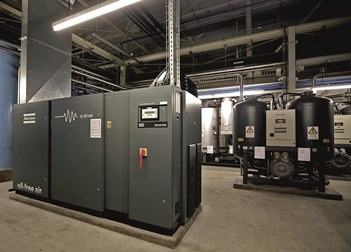Five Atlas Copco water-cooled, rotary screw compressors are providing semiconductor manufacturer Nanium SA with reliable, high-quality air, while an Atlas Copco ER900 heat recovery system enables the company to substantially reduce CO2 emissions and achieve exceptional energy savings.
Atlas Copco and Nanium SA, a semiconductor manufacturer in Vila do Conde, Portugal, have had a successful partnership focused on sustainable productivity for 16 years. From the beginning, Nanium chose Atlas Copco oil-free compressors combined with drying and filtering systems to obtain high-quality air. Carlos Costa, director of infrastructure management at Nanium, adds, “Atlas Copco had great experience in facilities for semiconductor factories with extremely high requirements in terms of reliability and air quality.”
Nanium currently has five Atlas Copco oil-free, water-cooled rotary screw compressors installed at its facility – three ZR 300s, one ZR 315 VSD with variable speed drive (VSD), and one ZR 400. The compressed air is used almost entirely within the clean rooms, in direct contact with the products under manufacture. Therefore, each of them is combined with a heated blower purge desiccant air dryer, or BD dryer, to obtain a high-quality dewpoint (PDP < -40C). Nanium also requires no oil and a low quantity of particles to standard ISO 8573 Class 0 to meet its strict standards.
 Atlas Copco ER900 heat recovery system.
Atlas Copco ER900 heat recovery system.
The company also chose Atlas Copco compressors to help improve energy consumption at the facility. “The selection was based on the possibility of having equipment working at full load, while the variable-speed compressor allows you to adapt compressed air production to the consumption of the facilities, always ensuring high levels of energy efficiency and optimal working conditions for the compressors,” Costa points out.
In addition to the five compressors, Nanium recently acquired an Atlas Copco ER 900 unit – a heated water management system for heat recovery in oil-free, water-cooled compressors. The ER 900 recovers heat from the compressors in the form of hot water. In order to meet Nanium’s needs, Atlas Copco changed the company’s compressor to discharge its cooling water at about 80°C. This hot water is pumped to a heat exchanger, whose secondary circuit circulates return water to the boiler. As a result, primary energy Gas input is dramatically reduced.
“This gave us the possibility of practically stopping the use of our boilers with gas burners, which resulted in a huge reduction in CO2 emissions, as well as in the energy bill,” Costa says. This, in turn, has reduced the consumption of natural gas at the facility by about 90 percent. In addition, the energy consumed by the compressors is also less expensive because of their role in the heat recovery system.
The partnership between the two companies is not only based on equipment, but also includes Atlas Copco equipment maintenance services, which Costa credits with keeping his “compressors working for 15 years, 24 hours a day without major problems and with a considerable savings.”
With a compressed air production capacity that exceeds current needs, Nanium does not anticipate an increase in installed capacity for the foreseeable future. However, Carlos Costa stresses the level of satisfaction Nanium has in its partnership with Atlas Copco. “Without a doubt, I would recommend using Atlas Copco equipment to others.”
Atlas Copco is an industrial group with world-leading positions in compressors, expanders and air treatment systems, construction and mining equipment, power tools and assembly systems. With innovative products and services, Atlas Copco delivers solutions for sustainable productivity. The company was founded in 1873, is based in Stockholm, Sweden, and has a global reach spanning more than 170 countries. In 2012, Atlas Copco had 39 800 employees and revenues of BSEK 90.5 (BEUR 10.5).
Oil-free Air is a division within Atlas Copco's Compressor Technique business area. It develops, manufactures, and markets worldwide oil-free and oil-injected air and gas compressors combined with air and gas treatment systems. The division focuses on sustainable solutions for all kind of industries where the gas quality is critical to the production processes. The divisional headquarters is located in Shanghai, China, and the production centers are in Antwerp, Belgium; Wuxi, China; Pune, India and São Paulo, Brazil.